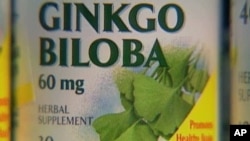Practitioners of alternative medicine have recommended ginkgo biloba as a means of maintaining and even improving memory among older adults. But until now, strong clinical evidence about its effectiveness has not been forthcoming.
For eight years, researchers at six universities across the U.S. studied more than three thousand adults, aged 72 to 96, with normal mental functioning or with mild cognitive impairment. Participants received either a 120-mg dose of gingko extract twice a day, or a sugar pill. Researchers found that gingko had no specific effect on memory or attention.
"What we can say is that we find no evidence that ginkgo, over this long period of time made a difference in whether someone's slow change in memory function, as a function of normal aging, was affected at all by the medication," said Dr. Steven Dekosky, at the University Of Virginia.
Earlier research showed that gingko did nothing for people with symptoms of Alzheimer's disease, nor did it help reduce other forms of dementia.
Researchers say this latest study is notable because it was conducted with the largest number of participants, and it rules out the herbal supplement as a useful treatment for memory loss.
"We found that there was no effect of the ginkgo biloba on these very slow but, clearly detectable changes in thinking function in late life," added Dr. Steven Dekosky.
But the researchers added one caveat: While gingko biloba is not effective in slowing down the mental changes of aging, they say it is safe and has no side effects.
Ginkgo Biloba Ineffective in Preventing Cognitive Decline

Ginkgo biloba is often recommended to prevent memory loss associated with aging. However, an eight year study shows that long-term use of the supplement does not slow the rate of mental decline in older adults.







